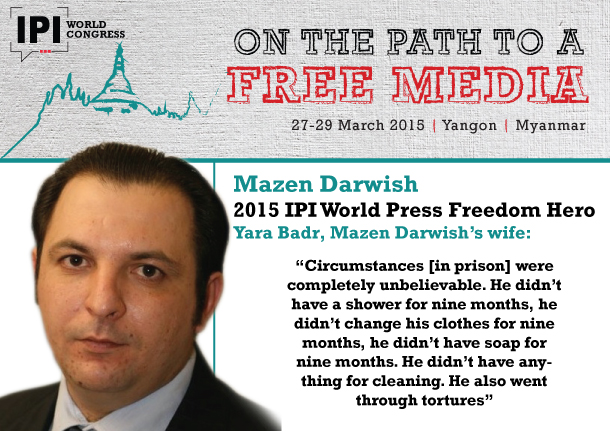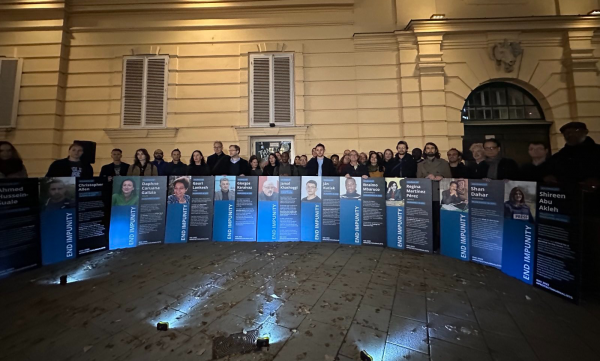The International Press Institute (IPI) today called on the Syrian government to release IPI World Press Freedom Hero Mazen Darwish, who has been imprisoned for over three years on spurious terrorism charges. IPI also called for the release of two of Darwish’s colleagues from the Syrian Centre for Media and Freedom of Expression (SCM) detained under similar circumstances.
Syria’s Anti-Terrorism Court is expected to render a verdict in Darwish’s case on March 25. In an interview with IPI this week, Darwish’s wife, activist Yara Badr, expressed hope that Syria’s Anti-Terrorism Court would honour an amnesty announced last year by the Syrian government that should have applied to her husband.
Darwish, SCM’s founding president, and his colleagues Hani Al-Zatani and Hussein Gharir have been imprisoned since Feb. 2012, when they and a number of other SCM employees were arrested during a raid on SCM’s offices by Syrian Air Force intelligence.
Darwish was held without charges until March 2014, when he was brought before Syria’s Anti-Terrorism Court and accused of “publicising terrorist acts” under Art. 8 of the 2012 Anti-Terrorism Law. The charges are reportedly connected to Darwish’s coverage of human rights violations and the situation of press freedom in Syria, which had been a major source of information for the international media until his arrest.
Badr said her husband had been held in very poor conditions for the first nine months of imprisonment. “Circumstances were completely unbelievable. He didn’t have a shower for nine months, he didn’t change his clothes for nine months, he didn’t have soap for nine months. He didn’t have anything for cleaning. He also went through tortures”.
In Aug. 2012, reports suggested that Darwish would face secret trial in a military court. The International Commission of Jurists expressed concern that he could face the death penalty without any right to defence, appeal or review.
In June 2014, the Syrian government announced a general amnesty for all persons charged under certain national security offences, including Art. 8 of the Anti-Terrorism Law. Darwish and his colleagues, however, were not released and the charges against them were maintained. While Darwish’s family and friends are hopeful that the court decision on March 25th will lead to his release, Badr expressed fear that the Anti-Terrorism Court might announce new charges “that are not included in the amnesty and he can spend 10 to 15 years in prison”. She estimated the odds of the court’s ruling in Darwish’s favour at “50 percent”.
Badr emphasised that pressure from the international community was key for Darwish and his colleagues. “The international community should work together for these human rights defenders not because of who they are but because of what they are fighting for”.
Intergovernmental bodies have sharply criticised the detentions of Darwish and others on spurious terrorism charges. In Jan. 2014 the U.N. Working Group on Arbitrary Detention called for the immediate release of Darwish and his colleagues. One month later, the U.N. Security Council demanded the release of all arbitrarily detained individuals in Syria. “We are very grateful for [the U.N.’s work], but we also ask the U.N. to follow up on the case”, Badr added.
IPI last month named Darwish its 67th World Press Freedom Hero in honour of his tireless work in support of media freedom and journalists’ rights in Syria. A ceremony honouring Darwish will take place on March 28 at IPI’s 2015 World Congress in Yangon, Myanmar.



